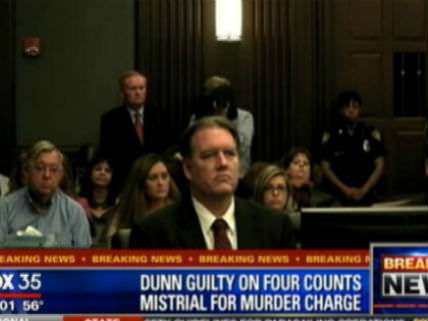The New York Times Says 'Florida's Contentious Self-Defense Law' Must Have Tripped Up Jurors in Michael Dunn's Murder Trial

Yesterday I asked whether the failure of jurors to agree on the murder charge against Michael Dunn in connection with his shooting of Jordan Davis had anything to do with Florida's recognition of a right to "stand your ground" when you are attacked outside your home. The short answer: maybe, but at this point there is no evidence to support that theory. The editors of The New York Times nevertheless really want to believe it's true, to the point that they are just making stuff up. Today's paper includes a "news analysis" by Lizette Alvarez under the headline "Self-Defense Law Hung Over Florida Jury." Someone at the Times must have noticed that there is no basis for that headline, because in the online version it has been changed to "Florida Self-Defense Law Complicated Jury's Job in Michael Dunn Trial." In truth, there is no basis for that asserion either, assuming it means that some special feature of Florida law prevented the jurors from reaching a verdict on the murder charge. Alvarez's lead is more tentative:
In failing to acquit or convict Michael Dunn on the most significant charge—the premeditated murder of a teenager in a dispute over loud music—a jury on Saturday may have run headlong into the breadth and reach of Florida's contentious self-defense law.
Like I said, maybe. But Alvarez offers no evidence whatsoever to back up that speculation. Instead she focuses on the question of whether Dunn reasonably believed Davis posed a deadly threat that could be neutralized only by shooting him. If Davis had a shotgun and threatened to kill Dunn, as Dunn claims, the shooting was justified. If Davis had no weapon and made no threats, the shooting was not justified. If Davis threatened Dunn (or merely shouted curses at him) and was holding something that Dunn mistook for a shotgun, the question is fuzzier: In the circumstances, was it reasonable for Dunn to believe Davis had a gun and intended to use it? But the question of what Dunn reasonably believed has nothing to do with the presence or absence of a duty to retreat.
Alvarez implies that the reasonable-belief standard is a special feature of "stand your ground" laws like Florida's, and the New York Times editorial board has explicitly said the same thing. But that is not true. This standard was part of Florida's law before the legislature eliminated the duty to retreat in 2005, and it is part of self-defense laws in states that New York Times editors no doubt consider more enlightened, such as New York, New Jersey, and Connecticut. The reasonable-belief standard is not some crazy idea invented by Florida gun nuts; it is the "conventional" approach in the United States, as Boston University law professor Kenneth W. Simons explains in a 2008 law review article:
In self-defense…it is conventional to ask whether the actor believes, and whether a reasonable person would believe, each of the following facts: (a) an aggressor was threatening him with harm, (b) that harm would be of a particular level of gravity, (c) his use of force in response would prevent that harm, (d) the level of responsive force he expects to employ would be of a similar level of gravity, (e) if the force was not used, the threatened harm would occur immediately, and (f) no nonviolent or less forceful alternatives were available whereby the threat could be avoided. United States law typically requires an affirmative answer to each of these questions.
Factor (f) implicates the duty to retreat when it is possible to do so safely, which in Dunn's case (if you buy his story) may or may not have been true. That is why I say Florida's "stand your ground" provision might have affected the outcome, assuming the holdout juror or jurors thought Dunn could have avoided danger simply by driving away. But the rest of the analysis, the issues that were the focus of Dunn's trial, would be the same with or without a duty to retreat.
Alvarez's effort to draw a logical connection between the Dunn trial and criticism of Florida's self-defense law is totally unpersuasive:
Until a juror speaks publicly about the deliberations, no one outside the 12 can know precisely what happened in the jury room. But agreeing on what constitutes a ''justified'' shooting—an ambiguous definition—could have been one problem, legal experts said.
This is why the Davis family and the parents of Trayvon Martin say they are joining forces with lawmakers to continue to fight to change Florida's so-called Stand Your Ground law. George Zimmerman, who claimed self-defense, was acquitted in July of Mr. Martin's shooting death. Under Florida self-defense laws, people can use lethal force and do not have to retreat if they ''reasonably believe'' it is ''necessary'' to save their lives or avoid great harm. The jury must, in essence, decide what a ''reasonable person'' would have done under similar circumstances. ''The law takes the position that you have to step into the shoes of the defendant,'' said Michael Band, a Miami criminal defense lawyer who was a longtime prosecutor in the city….
The problem, [University of Miami law professor Mary Anne Franks] said, lies, in part, with the term reasonable, which is ''squishy.'' One person's reasonable is another person's overreaction. Getting 12 jurors with contrasting world views to agree on that is not a simple task.
No doubt that is true, but jurors across the country face this same challenge of deciding whether a homicide was justified based on the reasonable-belief standard, regardless of whether their state imposes a duty to retreat. To say "that is why" critics want to change Florida's law is a non sequitur.


Show Comments (124)